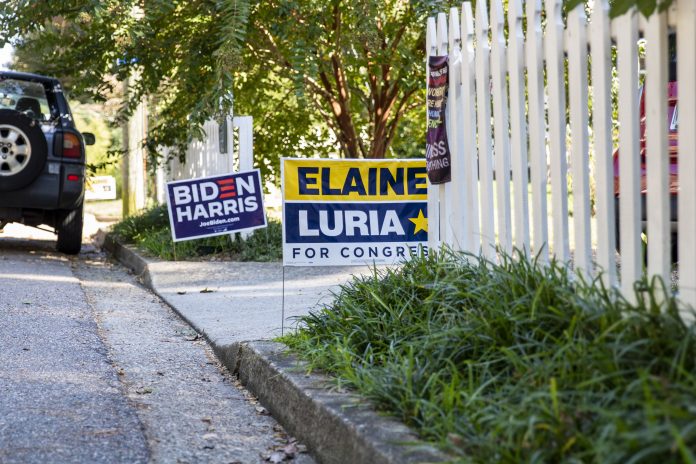After a contentious election season, College of William and Mary students will head to the polls Tuesday, Nov. 3 to vote in several contests up and down the ballot. In addition to selecting presidential and congressional candidates, voters will be able to respond to two Virginia amendment questions, one addressing partisan gerrymandering and another regarding tax exemptions for veterans.
Unsurprisingly, the 2020 presidential election is the marquee contest on this year’s ballot. President Donald Trump has faced a strong challenge from former Vice President Joe Biden, who looks likely to overperform former Secretary of State Hillary Clinton’s showing four years ago. Biden enters Election Day with almost an 8% lead in national polls, though close races in several competitive states — most notably Pennsylvania, North Carolina and Florida — still provide Trump with a credible path to victory in the Electoral College.
Virginia, which gave Clinton a modest victory in 2016, is not competitive in the presidential election this cycle. According to political forecaster FiveThirtyEight, Biden has a 99% chance of winning Virginia’s 13 electoral votes as of Nov. 2 and is expected to earn 55.6% of the statewide vote. Neither major candidate has devoted significant time or resources campaigning in Virginia; Trump hosted one campaign rally in Newport News, Va. in late September, but pundits speculated the event was primarily intended to reach voters in North Carolina, who overlap with the Hampton Roads media market.
Down ballot, incumbent U.S. Sen. Mark Warner is also up for reelection. First elected in 2008, Warner barely held off a challenge from former Republican gubernatorial candidate Ed Gillespie in 2014, but he is expected to comfortably coast to his third term. In a recent Washington Post poll, Warner led his Republican opponent, professor and retired United States Army colonel Daniel Gade by almost 20 points. As the current vice chairman of the Senate Select Committee on Intelligence, Warner is poised to lead the committee if Democrats take the Senate come January 2021.
Arguably the closest race on Williamsburg ballots this year is the House of Representatives election for Virginia’s 2nd Congressional District, which covers all of Virginia Beach and Williamsburg, portions of Norfolk and Hampton as well as several counties along the Chesapeake Bay. Rep. Elaine Luria is vying for a second term against her predecessor, Republican former congressman Scott Taylor, in one of the most competitive House elections in the country.
Like dozens of other Democratic freshmen in the House, Luria narrowly claimed victory two years ago despite her district’s conservative leanings. The 2nd Congressional District has a partisan voter index of R+3 according to the Cook Political Report, indicating a slight preference for Republican candidates at baseline, and it narrowly supported Trump in 2016. If Luria emerges victorious, strong margins among College students voting in Williamsburg will likely be at least partially responsible for electing the incumbent to her second term.
Aside from presidential and congressional races, Williamsburg voters will also face two proposed amendments to Virginia’s constitution. Question one asks voters to approve or reject a constitutional amendment that addresses partisan gerrymandering by transferring redistricting authority from the Virginia General Assembly to a new statewide redistricting commission, which would consist of eight Virginia General Assembly representatives as well as eight Virginia citizens. The amendment also permits the Supreme Court of Virginia to draw district boundaries if the commission fails to do so in a timely manner.
Enthusiasm for the amendment is fluid and does not fall strictly along party lines. While the Democratic Party of Virginia formally opposes the amendment, some of the state’s Democratic federal representatives — including Sen. Tim Kaine and Rep. Don Beyer — have mobilized on behalf of the proposal, as have many Republican state legislators. Polling on Question one is limited, so the amendment’s fate Nov. 3 remains unclear. If the amendment fails, Democrats intend to use their majority in the General Assembly to redraft proposals for a non-partisan redistricting strategy.
Virginia voters will also decide whether to approve Question two, a proposed constitutional amendment that would permit permanently disabled U.S. armed services veterans to exempt automobiles from state and local taxation. According to Ballotpedia, current Virginia law allows local jurisdictions to collect annual taxes on personal motor vehicles. The amendment would tweak existing law by allowing veterans with permanent disabilities related to their service to avoid paying local vehicle value taxes, conditional on whether the automobile is owned and used primarily by the eligible veteran.
While College students will likely have their eyes glued to the presidential election on Tuesday night and beyond, almost all races on the ballot may become significant, either by altering congressional control in Washington, D.C. or influencing political power in Richmond in the years to come.

